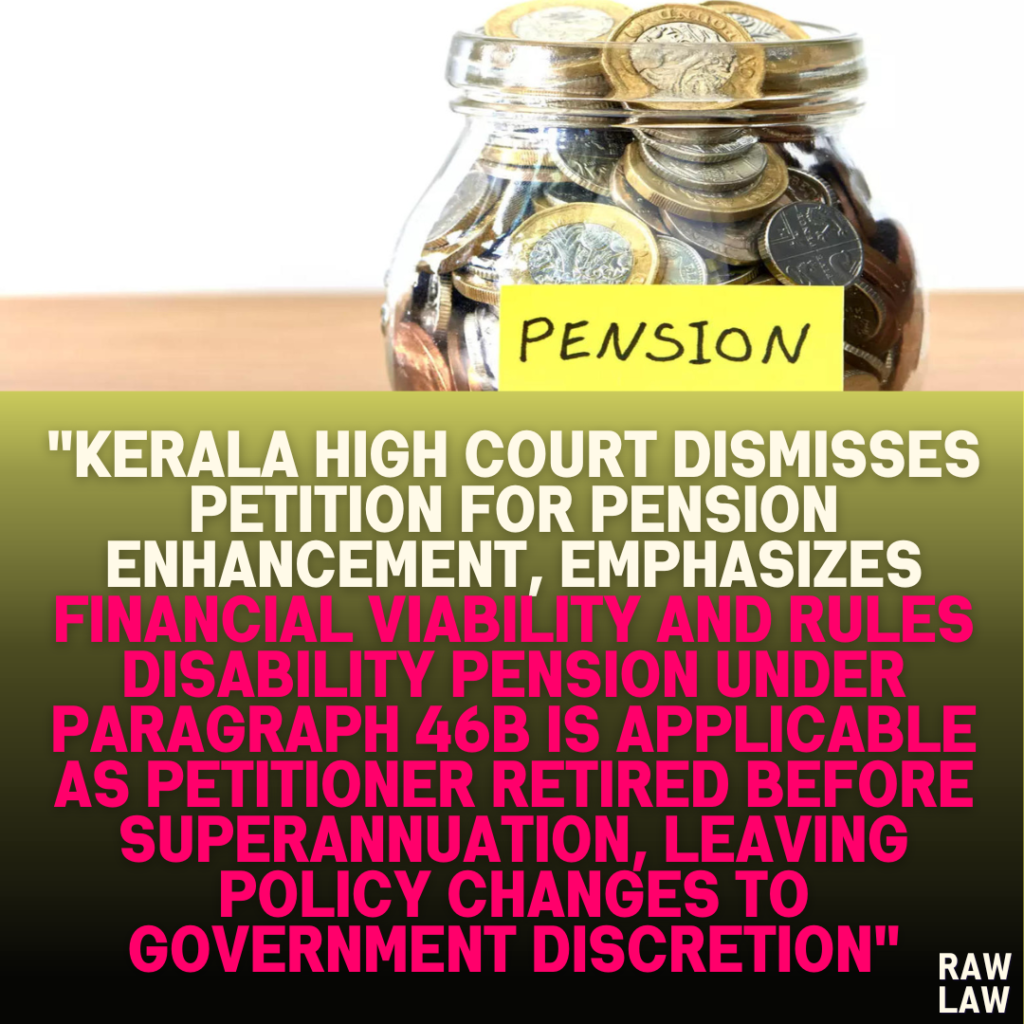Court’s Decision:
The Kerala High Court dismissed the writ petition seeking enhancement of pension under the Kerala Motor Transport Workers Welfare Fund Scheme. The court held that the petitioner’s entitlement was solely governed by the provisions of the Scheme, and since the petitioner did not serve until superannuation, he could not claim pension under paragraph 46A. The court emphasized that any increase in benefits must consider the financial sustainability of the welfare fund and dismissed the petition.
Facts:
The petitioner, a Goods Auto Driver, was diagnosed with Non-Hodgkin Lymphoma and applied for retirement from the Kerala Motor Transport Workers Welfare Fund Scheme due to ill health. He had over 10 years of service and received a disability pension of ₹1,600 per month. He argued that under paragraph 46A of the Scheme, he was entitled to a higher pension of ₹3,500. However, his request for an increase in pension was denied, with the respondents stating that any enhancement required a government decision.
Issues:
- Whether the petitioner was entitled to an enhanced pension under paragraph 46A of the Kerala Motor Transport Workers Welfare Fund Scheme.
- Whether the denial of pension enhancement violated the petitioner’s rights under the Welfare Fund Scheme.
Petitioner’s Arguments:
The petitioner contended that he had completed more than 10 years of service and was entitled to the full pension benefits under paragraph 46A of the Scheme. He argued that the pension granted was insufficient to meet his basic needs, given his medical condition. The petitioner requested the court to direct the respondents to enhance his pension from ₹1,600 to ₹3,500, in line with the Scheme’s provisions.
Respondent’s Arguments:
The respondents countered that the petitioner did not qualify for superannuation benefits under paragraph 46A, as he retired voluntarily due to illness before reaching the age of superannuation. They stated that he was only eligible for a disability pension under paragraph 46B, which provided for a minimum pension of ₹500 irrespective of the length of service, with the petitioner already receiving ₹1,600.
Analysis of the Law:
The court analyzed the Kerala Motor Transport Workers Welfare Fund Scheme, particularly paragraphs 46A and 46B. Paragraph 46A provides for pension benefits for members who retire on superannuation after completing 10 years of service, while paragraph 46B covers those who retire due to disability, entitling them to a lower pension amount. The court noted that the Scheme’s benefits are defined by limited resources, primarily from employer and employee contributions, with minimal government support.
Precedent Analysis:
The court referred to the well-established principle that welfare schemes are structured based on empirical data, with defined benefits for specific categories of employees. It reiterated that any liberal departure from the provisions of such schemes could compromise their financial sustainability, and the courts should avoid unwarranted interference.
Court’s Reasoning:
The court reasoned that the petitioner’s situation did not fall under the scope of paragraph 46A, as he retired before reaching the age of superannuation. Therefore, his pension entitlement was limited to the provisions of paragraph 46B, which granted him the disability pension. The court acknowledged the perceived disparity between employees who retire due to disability and those who retire on superannuation but stated that this was a policy matter for the government to decide, balancing the Scheme’s financial viability.
Conclusion:
The court dismissed the writ petition, holding that the petitioner was not entitled to claim an enhanced pension under paragraph 46A. The court ruled that the petitioner’s pension could only be computed under paragraph 46B, which governs disability pensions, and any policy changes were within the government’s purview.
Implications:
This ruling reinforces the principle that welfare schemes must balance the needs of individual beneficiaries with the overall financial sustainability of the fund. It highlights the limited scope for judicial interference in policy decisions related to pension schemes, particularly where defined benefits are structured around limited resources. The court’s decision sets a precedent for similar cases involving pension claims under the Kerala Motor Transport Workers Welfare Fund Scheme.




Pingback: Supreme Court Reduces Death Penalty to 20 Years Rigorous Imprisonment for Father Convicted of Murdering Pregnant Daughter for Inter-Caste Marriage, Citing Cognitive Impairments and Potential for Reform: “Crime Does Not Meet the Rarest of Rare Threshold